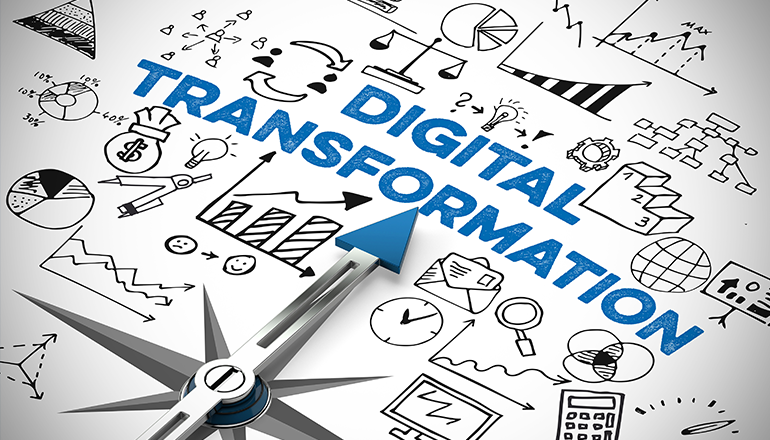How will digital transformation help your organisation grow?
Everything about digitalisation: what it is, what benefits it gives to the business, what it consists of and what tools a company needs to adapt to new conditions?

What Is Digital Transformation of a Company?
Digital transformation is the process of applying advanced technologies in the business processes of an organisation. This strategy involves not only the installation of the latest software or tools. But also the main changes in approaches to management, external communication, and organisational culture. Due to this, the efficiency and satisfaction of each employee develop. And the organisation gets a status for being a modern and growing company.
Digital transformation empowers companies to expand their capabilities and reach. It also maximises the efficiency of their asset and business value chains. Key technologies such as cloud computing, the Industrial Internet of Things (IIoT), artificial intelligence, augmented and virtual reality transforms traditional industrial operations. These innovations provide unprecedented potential for business growth. But, they also bring unknown risks for the modern enterprise, such as cybersecurity and data privacy. These factors bring new uncertainty to the industrial business environment.
What Are the Benefits of Digital Business Transformation?
Improving customer experience
Customers are one of the main drivers of digitalisation. Every day they interact with commercial and government companies, many of which have already begun to transform their operations. In such cases, the client sees that modern technologies make processes faster and easier and therefore expects such changes from other enterprises.
By customer experience, we mean interaction with the company of external customers and internal customers. Digital transformation of processes optimises the work of enterprise employees and increasing the productivity of each team member. For example, the automation of routine operations provides more time for solving significant and complex tasks.
Flexibility and acceleration of business processes
There is an expression: "Companies are fast or dead." In the digital economy, this phrase is more than relevant. An enterprise does not use the capabilities of modern technologies. It does not adapt to the crazy pace and peculiarities of doing business. It will not be able to compete with those who are already doing it.
To achieve success, you have to soft and agile, not change when the opportunity arises, but when the need arises. It aims to ensure that organisations can make decisions swiftly, immediately adjust their business to current requirements and satisfy the requirements of clients.
Innovative opportunities for business development
The digitalisation of companies reveals the door to creative methods of business development:
- Cloud technology offers multiple users to work simultaneously on the same project and effectively utilise resources.
- As part of the Mobile-First strategy, the organisation receives and generates mobile data traffic, which statistically exceeds all fixed-line traffic.
- Ready-made solutions save troubleshooting time. The multitude of apps, extensions, and connectors simplify your business and need minimum time to implement and configure.
All these and other digital transformation technologies have lowered the threshold of entry into many areas. Starting and developing the new business has become more accessible thanks to the vast number of tools that industries and enterprises' digitalisation provides.
Using modern technologies for working with data
Information is a principal resource in the modern world. Every second, humanity generates large amounts of digital data. It not only take up storage space but also helps companies do business. It is necessary to accumulate, structure, and analyse to take advantage of available information.
The digital transformation of the enterprise contributes to this thanks to advanced technologies. For example, Artificial Intelligence and Big Data. They are aimed at processing flows of information, based on which you can make decisions, adapt offers for specific customers, and predict their behaviour.
Partnership and collaboration
It is hard to imagine a successful modern business without partners. Digitalisation opens up new opportunities for collaboration with other companies - and these opportunities are truly incredible. For example, thanks to modern technologies, geography is no longer an obstacle to work: you can conduct business and look for partners anywhere in the world. And the open API makes collaboration even easy and more convenient. For example, in the digitalisation of finance, incl the banking industry, APIs have been in use for several years.
It is also worth remembering that it is impossible to become the best or work with the best without digitalisation. Leading companies are already implementing digital transformation strategies in their lives and wish to partner with those who match their level and share their values.
Conditions for Digital Transformation and Ingredients for Success
Strategy
An employee of the company responsible for the digital transformation of the enterprise must clearly understand its need for these conditions. A study by 451 Research shows that 60% of companies that have chosen the digital path for themselves do not have a corresponding approved strategy. It is the road to nowhere.
Without a clear strategy and vision, it is impossible to digitalise a company of any size. You need to understand how digitalisation will help an enterprise move in the right direction and achieve its goals.
Motivated team
The development of modern technologies, which are the basis of digitalisation, is characterised by an exciting feature. Every year the products are becoming more customer-oriented, that is, their use becomes more and more simple, and convenient. For example, the Creatio business process management solution includes low-code tools that allow you to independently launch the system and customise it to the enterprise's needs using custom settings.
In such conditions, the motivation of top management and employees responsible for transformation comes to the fore. Team members must understand the purpose of the changes, get imbued with the idea that digitalisation is not an option. It is a requirement of today, and convey this idea to all staff. Only if the team understands the importance of the process, the ultimate success is possible.
Personnel adaptation
The introduction of digitalisation technologies is just one step. Often, business owners and change managers find that the most challenging part is adapting the team to the updated business processes. Transformation concerns every employee of the enterprise, in connection with which it will be necessary to carry out several activities that will allow people to master new processes and technologies.
Such events include training and master classes in which the personnel receive the necessary skills to work in the updated conditions. It is also worth noting that modern technologies themselves become assistants in adaptation: for example, the development of UX design makes the program interface intuitive, and artificial intelligence helps to process data faster and make optimal decisions.
Digitalisation technologies
Choosing the right technology investment is complex and requires in-depth analysis. To address this challenge, it is worth considering four fundamental technology principles that will drive a successful digital transformation and ensure your business's best investment return.
1. Holistic value chain
Modern digital platforms need to be profitable along the entire value chain associated with your enterprise. Technology investments must digitally integrate design, planning, and operations, governance, visualisation, information, and asset performance management solutions to create a complete view of the entire enterprise at all levels.
2. Platform independence
Interoperability and cross-platform support accelerate the path to continuous process improvement. The rapid exchange of big data and analytic information between various platforms, including cloud and mobile solutions and augmented and virtual reality systems, requires system-independent technology that does not replace but complements investments in existing assets. An open, system-independent approach contributes to long-term value creation and lowers the total cost of ownership (TCO).
3. Digital ecosystems
A multifunctional ecosystem of technology partners must back technology investments. Ecosystems must include the design, development, supply, maintenance, and support of industry solutions globally. Your ecosystem partners in this enterprise can consist of software developers, technical distributors, system integrators, OEMs, and technology partners, all with a stake in adding value and driving innovation to your business.
4. Flexible implementation
Adapting to unforeseen events becomes automatic if you use flexible technology implementations. Digital transformation platforms help your teams choose the right mix of deployment options, including on-premises, cloud, and hybrid deployments. Flexibility in terms of purchase allows you to try out multiple perpetual licensing or subscription options. Step-by-step technology-as-needed solutions can help your business lower upfront costs and shorten the time to return on your technology investment, making your strategy to increase profitability more effective.

